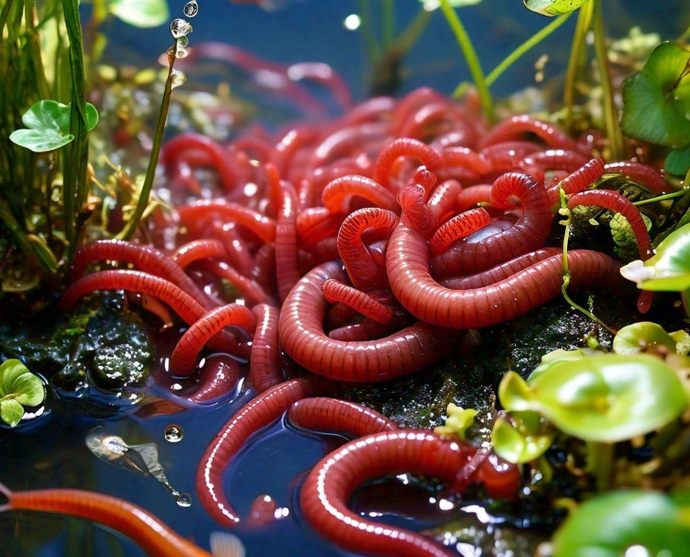Rise Soil Wellness Naturally With Red Wigglers
The integration of red wigglers into soil management techniques provides an engaging approach for improving soil wellness normally. These earthworms not just change organic waste right into important vermicompost, yet their natural actions also promote boosted dirt structure, aeration, and nutrition schedule.
Benefits of Red Wigglers

Moreover, red wigglers improve dirt structure by developing channels as they burrow through the planet. This task improves oygenation and drain, helping with root development and making certain that plants obtain ample oxygen and dampness. Furthermore, the castings produced by red wigglers are high in nutrients such as nitrogen, phosphorus, and potassium, which are vital for plant growth.
Red wigglers also aid in the decrease of unsafe virus and bugs by outcompeting them for resources, even more adding to a much healthier soil atmosphere. Their existence can lead to a decline in the demand for synthetic fertilizers and chemicals, promoting lasting agricultural practices. Overall, integrating red wigglers into dirt monitoring methods offers an all-natural and efficient means of boosting soil vitality, therefore supporting robust plant development and agricultural performance.
Establishing Up Vermicomposting
Developing a vermicomposting system is a practical means to harness the amazing advantages of red wigglers in enhancing dirt health. red wigglers. To start, select an appropriate container-- preferably, a plastic or wooden container with a lid to preserve dampness and temperature. The container should have water drainage holes to stop excess water accumulation
Following, prepare bedding material, which works as a habitat for the worms. Ideal materials include shredded paper, cardboard, or coconut coir. Objective for a deepness of 4-6 inches to provide sufficient room for the worms.
When the bedding remains in area, introduce the red wigglers, normally at a proportion of one pound of worms for each square foot of surface in the container. Following this, add cooking area scraps such as fruit and vegetable peels, coffee grounds, and smashed eggshells. Stay clear of meat, dairy products, and oily foods, as these can draw in parasites.
Caring for Your Worms
Preserving the health of your red wigglers is necessary for a flourishing vermicomposting system. Correct care makes sure that these valuable organisms can effectively damage down organic matter and improve your soil.
Feeding your worms is an additional key aspect of their treatment. Red wigglers thrive on kitchen area scraps such as fruit and veggie peels, coffee grounds, and crushed eggshells. Avoid feeding them citrus fruits, onions, and milk items, as these can create an unwelcoming environment. Monitor the quantity of food you provide to avoid overfeeding, which can lead to smell issues and attract bugs.
Temperature level monitoring is essential; worms favor an array of 55 to 77 levels Fahrenheit. Ensure the container is not subjected to guide sunlight or extreme cold. Regularly examine for indicators of distress, such as extreme worm movement or uncommon smells, to address any kind of possible troubles immediately. By complying with these guidelines, you will certainly promote a healthy ecosystem for your red wigglers.
Utilizing Worm Castings in Dirt
Worm castings, frequently described as "black gold," are a powerful modification that can dramatically improve soil health and fertility. red wigglers. These nutrient-rich, organic fertilizers are generated by red wigglers throughout their digestion procedure, resulting in a carefully textured product that is helpful for plants and soil alike
Incorporating worm spreadings into your soil boosts its structure, enhancing oygenation and water retention. This is specifically advantageous for sandy dirts that drain pipes as well quickly, along with hefty clay dirts that can end up being compressed. Worm castings are brimming with necessary nutrients, including nitrogen, phosphorus, and potassium, which are crucial for plant growth.

Inevitably, the usage of worm spreadings cultivates a growing ecological community within the dirt, leading to healthier plants and even more lasting horticulture methods.
Tips for Effective Composting
Effective composting calls for careful attention to a few essential concepts that can significantly improve the top quality of the final product. Equilibrium is vital; preserve a proper proportion of eco-friendly materials (nitrogen-rich) to brownish materials (carbon-rich), ideally around 1:3. This equilibrium assists in efficient decomposition and decreases smells.
Second, aeration plays a vital duty. On a regular basis turning the compost heap enhances oxygen circulation, which speeds up microbial activity and quicken review the composting process. Go for a heap size of at the very least three feet by 3 feet to keep warmth, which additionally promotes decay.
Moisture content is another important variable; the garden compost needs to be damp but not soggy. A good rule of thumb is to achieve a wetness degree comparable to that of a wrung-out sponge. Excessive water can bring about anaerobic problems, while insufficient can decrease decomposition.
Finally, check the temperature of the compost. A temperature variety of 130 ° F to 160 ° F suggests active composting and aids eliminate virus and weed seeds. By sticking to these principles, you will create a nutrient-rich garden compost that sustains soil health and enhances plant development.
Verdict
Integrating red wigglers into gardening techniques improves soil health via natural processes. These worms add to the failure of natural materials, causing nutrient-rich vermicompost that enhances soil framework and fertility. Their tunneling actions advertise aeration and water drainage while subduing dangerous microorganisms and insects. By developing and preserving a vermicomposting system, gardeners can cultivate a lasting ecosystem that sustains robust plant growth and lasting dirt resilience, eventually benefiting farming productivity and ecological health and wellness.
Comments on “Thriving red wigglers: Their role in reducing waste”